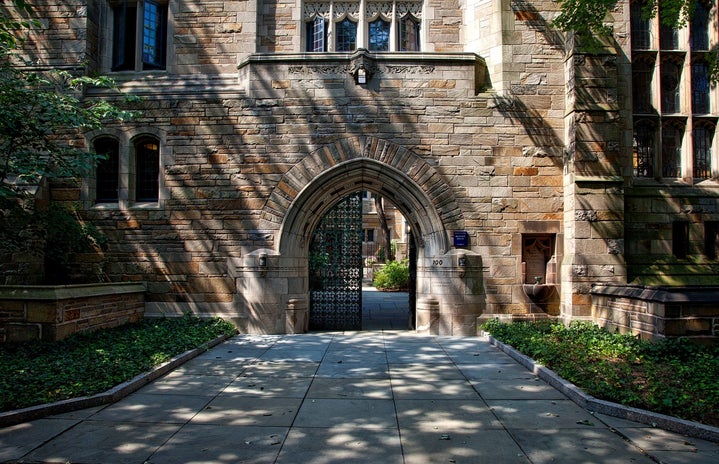This past summer, I interned at New Directions Domestic Abuse Shelter of Knox County in Mount Vernon, Ohio. Though I primarily managed the shelter’s social media accounts, the time I spent working alongside the dedicated staff members taught me a great deal about domestic and intimate partner violence. I learned about the signs of an abusive relationship, the difficulties of escaping an abuser, and the way trauma affects the brain. Now that I am back at college, one particular statistic I learned stands out as I readjust to campus life: women ages 18-24 and 25-34 experience the highest rates of domestic/intimate partner violence. Of course, domestic and intimate partner violence do not exclusively affect women or individuals in these age groups. Anyone—regardless of gender, race, sexuality, or age—can experience domestic or intimate partner violence. However, this statistic serves as a reminder that we need to discuss abusive relationships on college campuses.
To get this discussion started, I asked Betty Pealer and Matt Hellman (Advocate/Administrative Assistant and Executive Director of New Directions, respectively) what they think college students need to know about domestic (DV) and intimate partner violence (IPV).
What do you feel are the most common misconceptions about DV/IPV?
Betty: “[The belief] that it is happening to ‘other people’ when likely everyone has friends, family, or neighbors who are [experiencing] or have experienced DV/IPV.”
Matt: “[The belief that] behavior that fails to rise to the level of physical striking can’t be domestic or intimate partner violence. [In reality,] verbal, financial, sexual abuse, and threats of violence all constitute domestic or intimate partner violence. While bruises and broken bones heal, the mental, emotional, and psychological scars of these types of abuse can be extremely damaging and long-lasting.”
Why should college students be aware of the signs of DV/IPV?
Betty: “Awareness contributes to safety and change for yourself, your friends/family, your community, and society as a whole. We are all raised with certain perceptions of what a healthy relationship is, and abuse should never be a part of that equation. Positive relationship qualities should be promoted and reinforced at every opportunity, and abuse should be called out and discouraged in any way possible—whether that be on a personal, institutional or legal/judicial level.”
Matt: “Amidst the national conversation about sexual violence on college campuses, we must work to ensure that intimate partner violence also remains part of the focus. According to the National Coalition Against Domestic Violence, intimate partner violence with a current partner is as prevalent an issue among college students as sexual assault. From October 2014 through February 2015, there were multiple murders and murder-suicides on and around college campuses involving partners and ex-partners, including February 1 at Miami University of Ohio—and these cases only became known because of their outcomes; so many more go unreported. According to Lisa Maatz, vice president of government relations at the American Association of University Women, preventing nonsexual partner violence should be approached in the same manner as preventing sexual assault on college campuses because ‘it’s all on a continuum.’”
How can college students help spread awareness about DV/IPV?
Betty: “Talking about an issue fosters awareness and conversation, thereby leading to activism.”
Matt: “Watch out for each other. Fraternities and sororities view each other as ‘brothers’ and ‘sisters.’ All students should take a similar approach to their peers. Warning signs of violence may include bruises and other signs of impact on the skin with the excuse of ‘accidents,’ frequent and sudden absences from class or other activities, decreased productivity or drop in grades, and isolation from friends or family.”
What is the most surprising thing you’ve learned about DV/IPV while working at New Directions?
Betty: “Domestic violence is still the ‘secret’ many people are uncomfortable talking about, but the more awareness there is to the issue, the easier it is to encourage people to seek help.”
Matt: “That domestic and intimate partner violence is not limited to persons of lower economic and educational levels. It cuts across the spectrum of income, education, gender, sexual orientation, religion, nationality and every other measure of diversity. While it will appear different in each individual situation, at the heart it is based on one person’s attempt to maintain power and control over another.”
Domestic and intimate partner violence on college campuses is a serious issue. While it is beginning to attract more media attention (even Buzzfeed wrote an article about it), far too many people remain unaware of the prevalence of abusive relationships. Living in such a small, tight-knit college community, it’s difficult to think that someone we know could be experiencing domestic violence. As Betty said, it’s easy to dismiss abuse as something that happens to other people, not those closest to us. However, by avoiding discussions of domestic violence and refusing to believe that it happens at Kenyon, we also dismiss the victims of this abuse. When we do not acknowledge signs of potentially violent relationships, we miss opportunities to help victims, thus prolonging their abuse. Therefore, in honor of Domestic Violence Awareness Month, take a few minutes to learn about the signs of an abusive relationship and how you can help a friend who is experiencing domestic violence. You never know when this knowledge could help you save a friend, classmate, family member, or even yourself.
To learn more about domestic and intimate partner violence and how to identify it, visit New Directions’ blog. If you think that you or someone you know may be in an abusive relationship, call 740-397-4357 to talk to a New Directions staff member about your situation or reach out to one of the following on-campus resources:
Campus Safety: (740) 427-5000
Sexual Misconduct Advisors Hotline: (740) 358-1544
Peer Counselors Hotline: (740) 398-3806
Counseling Center: (740) 427-5643
Image Credit: PBS, NO MORE, The National Domestic Violence Hotline

